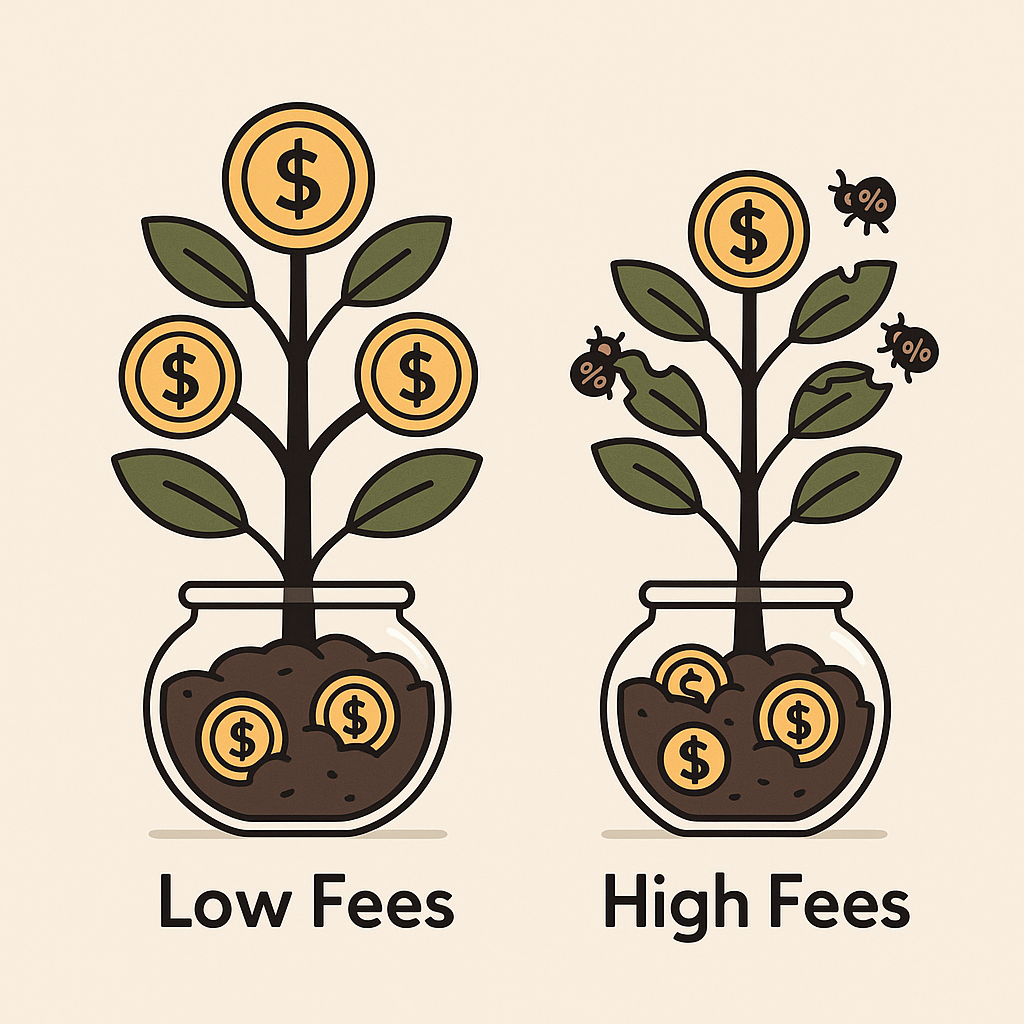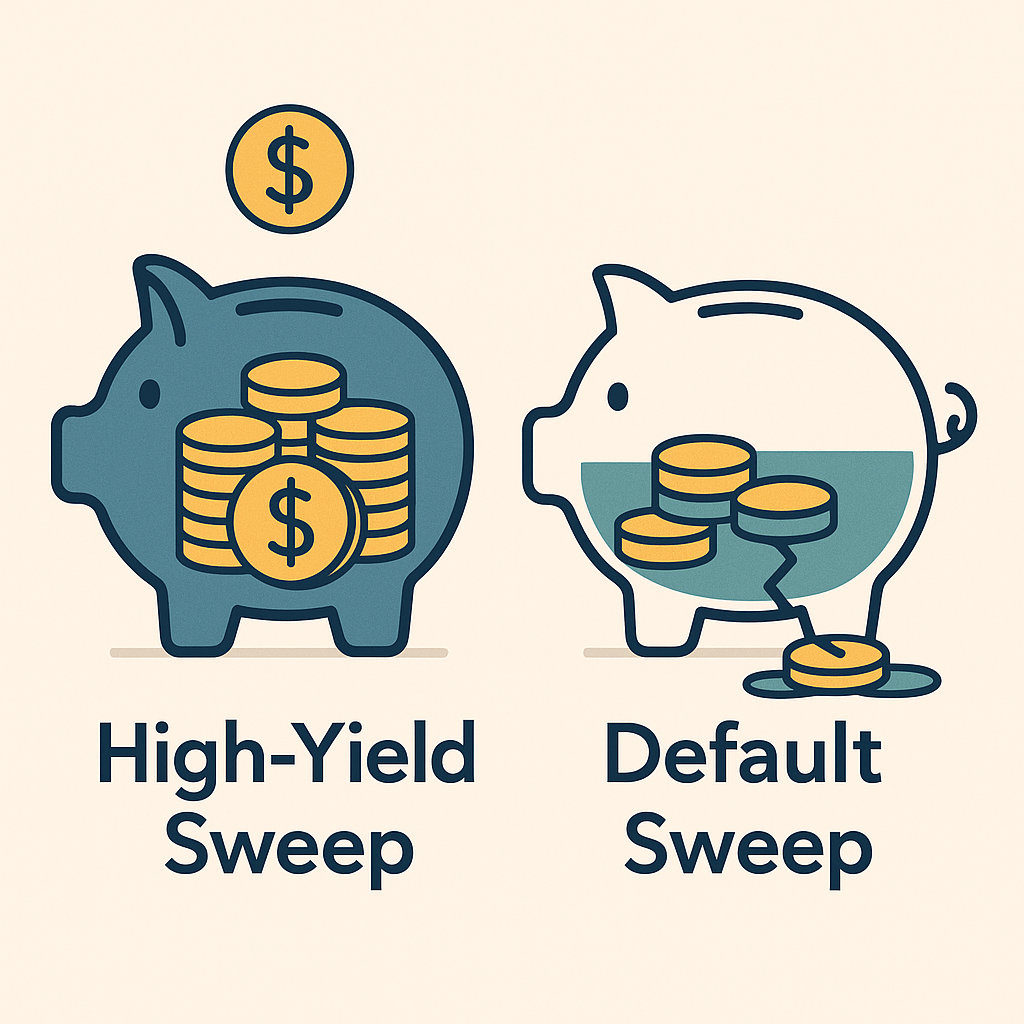Before We Begin: The Most Important First Step
Choosing an investment account can feel like a huge decision, especially when you’re stuck in the classic Fidelity vs Schwab vs Vanguard debate. Before you can pick the right vehicle for your financial journey, you need a map.
That map is your Investment Policy Statement (IPS). I know, it sounds super formal, but it’s the most important document you’ll create to protect yourself from making bad, emotional money decisions. Think of it as your personal rulebook for investing.
If you’ve never heard of an IPS, I highly recommend pausing here to check out our other articles. They’re the foundation for everything we’re about to do. We made a two-part masterclass to walk you through it:
- First, see why you need one: [How an IPS Helps You Avoid Big Portfolio Mistakes].
- Then, learn how to make one: [Write Your IPS in 6 Simple Steps].
And to make it even easier, I’ve put together a template you can just download and fill out.
➡️ [Downloadable Resource Link: Get Your Free Investment Policy Statement (IPS) Template PDF]
Having your own “map” is a huge deal. Because today, we’re tackling the next big question: picking your car.
A Quick Note From Me: My goal isn’t to tell you which broker is “the best.” A single “best” doesn’t exist. Instead, I want to give you a clear, honest way to choose the one that’s best for you. I based this analysis on info that’s out there for anyone to see as of August 2025. It’s just for learning purposes!
Part 1: The Big Three Brokerages—Finding Your Fit
From ‘What’ to ‘Where’: A Fidelity vs Schwab vs Vanguard Showdown
Our road trip today has three stops. You are here: Stop 1: The Vibe & The Real Costs → Stop 2: The Features & The Feel → Stop 3: The Final Call.
Okay, you’ve got your map (your IPS). Now you need a car to drive. This brings us to the question I get asked all the time: which broker is best in the Fidelity vs Schwab vs Vanguard debate?
Choosing between them can feel like you’re stuck. I get it. But the secret isn’t finding one “best” answer. It’s finding the one that matches your personality.
This guide will give you a clear framework for comparing Fidelity vs Schwab vs Vanguard so you can confidently pick your winner.
First, Let’s Find Your Financial DNA

Answer two quick questions. They’ll help you see which broker’s vibe might be a natural fit for you.
- When you get a new gadget, you usually: A. Start playing with it right away and figure it out as you go. You want all the features, just in case. B. Read the manual or watch a few tutorial videos first so you understand it completely. C. Only care about its main function. You ignore all the extra bells and whistles.
- Your dream car is: A. A top-of-the-line SUV with all the new tech, heated seats, and the power to go off-road if you wanted to. B. A super-reliable sedan with the best safety ratings and a great warranty. You trust the brand. C. A no-frills, super-efficient hybrid that saves you the most money on gas, even if it’s a little basic.
Count up your answers:
- Mostly A’s? You sound like an All-Rounder. You’ll want to watch Fidelity.
- Mostly B’s? You might be a diligent Educator. Pay close attention to Charles Schwab.
- Mostly C’s? You have the mindset of a Purist. Vanguard could be your new home.
Now, let’s see if your quiz result feels right as we meet the brokers.
Which Vibe Fits You in the Fidelity vs Schwab vs Vanguard Comparison?
🚙 Fidelity: The All-Rounder. In the Fidelity vs Schwab vs Vanguard matchup, think of Fidelity as the high-tech SUV that can do it allThey built their platform to be a beast for everyone. It gives you tons of flexibility with a modern app, lots of investment choices (even crypto), and the power to grow with you.
🏛️ Charles Schwab: The Educator. Schwab is like a fancy university with an amazing library. Its biggest strength is its mountain of free learning tools—articles, videos, and even live coaches—to help you get smarter about investing. It’s perfect for the person who feels better after doing their homework.
🔪 Vanguard: The Low-Cost Purist. Vanguard is like a perfect, pro-grade kitchen knife. It does one thing flawlessly. They started the company just to keep costs as low as possible. Their whole vibe is about playing the long game with simple, proven investments.
Fidelity vs Schwab vs Vanguard: The Real Costs Beyond Free Trades
You’ve seen the ads for “$0 trades.” That’s awesome, but it’s totally standard now. It’s like a coffee shop offering free Wi-Fi—it doesn’t make them special.
The real costs—the ones that actually affect your money long-term—are a little more hidden.
What’s an Expense Ratio? (aka, The Silent Portfolio Killer)

An expense ratio is the small fee that an investment fund charges you every year to run itself.
Imagine you hire two personal trainers. They both give you the exact same workout plan. Trainer A charges you $2 a year. Trainer B charges you $50 a year. It doesn’t sound like much, but after 30 years, that ‘small’ difference means Trainer A’s client has thousands of extra dollars.
That’s the power of low fees, and it’s a huge factor in the Fidelity vs Schwab vs Vanguard decision.
Is Your Broker Paying You Pennies on Your Cash?
Here’s a pro tip most beginners miss. When you have cash just sitting in your account, what happens to it?
“This one thing can cost you hundreds or even thousands of dollars over time. 💵”
Fidelity and Vanguard automatically put your extra cash into funds that pay you a high interest rate. But Schwab, by default, puts it in a program that pays almost nothing. This whole setup has actually gotten them into some legal trouble because the difference is so huge.
Let’s put some real numbers on this.

The “Hesitation Tax” Calculator
See what this could cost you. Type in an amount of cash you might have sitting around before you invest it.
References
- Bankrate. (2025, July). Best online brokers for beginners in July 2025.
- Charles Schwab. (n.d.). Schwab Stock Slices™. Retrieved July 31, 2025, from https://www.schwab.com/fractional-shares-stock-slices
- Fidelity. (2024, December). Information regarding third-party cybersecurity incident. [Hypothetical reference for the described data breach event.]
- Fidelity. (n.d.). Fidelity ZERO® index funds. Retrieved July 31, 2025, from https://www.fidelity.com/mutual-funds/investing-ideas/index-funds
- Fidelity. (n.d.). Stocks by the Slice℠. Retrieved July 31, 2025, from https://www.fidelity.com/learning-center/trading-investing/fractional-shares
- Fidelity. (n.d.). Ways to manage your cash. Retrieved July 31, 2025, from https://www.fidelity.com/go/manage-cash-rising-costs
- Investopedia. (2025, August). Best Online Brokers and Trading Platforms for August 2025.
- OneRep. (n.d.). Fidelity data breach: How to protect your data now. [Illustrative link of the type of source covering such an event.]
- Ropes & Gray LLP. (2025, July). District court strikes down $40 million settlement agreement in target-date funds case based on objector arguments.
- SmartAsset. (n.d.). Thinkorswim review. Retrieved July 31, 2025, from https://smartasset.com/investing/thinkorswim-review
- Sokolove Law. (n.d.). What is a cash sweep program? Retrieved July 31, 2025, from https://www.sokolovelaw.com/consumer-fraud/securities-fraud/cash-sweep-programs/
- Vanguard. (n.d.). Service fees for your Vanguard Brokerage Account. Retrieved July 31, 2025, from https://investor.vanguard.com/client-benefits/account-fees
- Vanguard. (n.d.). What is dollar-based investing? Retrieved July 31, 2025, from https://investor.vanguard.com/investor-resources-education/article/what-is-dollar-based-investing
- Wagner Law Group. (2025, January). After slashing yield on ‘sweep’ cash to bare minimum, Schwab & Co. are sitting on a record $250 billion-plus pile of it, accepting the risk it could vanish in a flash. RIABiz.